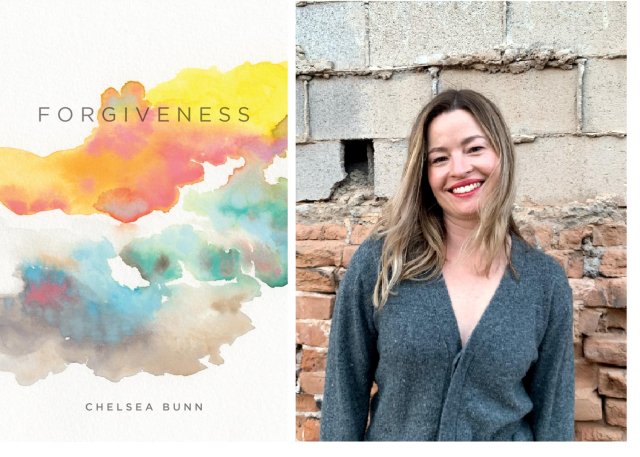“once we have the opportunity to grieve completely, these memories can be accessed again, and with a richness and vividness we may not have expected.”
 Forgiveness (Finishing Line Press, 2019)
Forgiveness (Finishing Line Press, 2019)
What are some of your favorite chapbooks? Or what are some chapbooks that have influenced you?
Some chapbooks I love are Tiana Clark’s Equilibrium (Bull City Press), Kaveh Akbar’s Portrait of the Alcoholic (Sibling Rivalry Press), Nicole Sealey’s The Animal After Whom Other Animals Are Named (Northwestern University Press), and Emily Jungmin Yoon’s Ordinary Misfortunes (Tupelo Press). I’m looking forward to reading Carl Phillips’ Star Map with Action Figures, which was just released by Sibling Rivalry Press.
What obsessions led you to write your chapbook?
Grief, loss, addiction, recovery, loneliness, forgiveness (surprise!), prayer.
What’s the oldest piece in your chapbook?
The oldest poem is “Each Evening,” which I started writing in 2005 in my MFA program. I took it through a series of revisions, had it published in a journal, and then forgot about it. The rest of the poems in the book were written much later, and many were written specifically for the book. As I was arranging it, I started to feel like it needed something older; I wanted to include a version of the speaker anchored in a time before the experiences addressed in the rest of the poems. The father is still alive here, and he is an active participant in his relationship with the speaker. I felt it was important to extend a hand back through time and pull into the book a memory related to this relationship, much like the process of grief itself: the immediate emotional disruption after a loss can make memories difficult or painful to recall, but once we have the opportunity to grieve completely, these memories can be accessed again, and with a richness and vividness we may not have expected.
Which poem is the “misfit” in your collection and why?
The poem, “Valentine’s Day 2012: Last Message From My Father” is, I think, the biggest departure from the rest of the poems in the book. It is a verbatim transcription of the last voicemail I received from my father before he died. It’s something I’ve never read to an audience, and I don’t believe I ever will. It feels very private, but I wanted to invite my father’s voice into the book in a direct way, to give his character a bit more space and complexity, without the speaker’s commentary.
Do you have a favorite revision strategy? What is it?
Terrance Hayes told me at the Lighthouse Writers Workshop that I need to give myself permission. It’s made a big difference in the way I revise—now, I try to ask of every poem: am I giving myself permission to say (through language), do (through technique or strategy), or be (through emotion) exactly what I want to, even if it feels uncomfortable, weird, scary, or too big? Oftentimes the answer is no, so I know I have my work cut out for me as I move forward.
To what degree did you collaborate on the cover image and design of your chapbook?
I have the very good fortune of having a partner (Robert Christopher) who is a wonderful artist and graphic designer. He designed the cover, front and back, and made the watercolor painting for the front cover. All I knew was that I wanted something abstract that incorporated yellow and pink, and he took it from there. We went through a few different iterations of the cover before landing on this one. We enjoyed collaborating on this so much that he has since created a series of watercolors, each based on lines from poems in the chapbook. For someone who’s not a poet himself, he has a remarkable ability to closely read my work and reinterpret it visually.
What are you working on now?
I’m slowly drafting poems toward my first full-length collection and teaching creative writing at Navajo Technical University.
What advice would you offer to students interested in creative writing?
Read every day. Read everything. Read widely, listen carefully. Read work by people who don’t look or sound like you. Listen to poetry podcasts (some of my favorites: Commonplace, VS, The Slowdown, The New Yorker: Poetry, This is Just to Say, and The Poetry Gods). Keep submitting your work and teach yourself how to handle rejection in a way that feels useful for you. Sharon Olds said, “When I get a poem rejected, I always look at it with my pen in hand, looking for what’s wrong with it. And if I can’t find anything that I think is wrong, okay. But very often, knowing that it’s come back, I’m inspired to see how I could maybe make it less worse if I agree that it has problems” (Divedapper, December 2015).
What question would you like to ask future writers featured at Speaking of Marvels?
I would love to hear more poets talk about the business side of publishing, especially promotion, marketing, publicity, sales, book tours, websites, agents, and contracts.
*
Chelsea Bunn is the author of Forgiveness (Finishing Line Press, 2019), which was a finalist for the New Mexico/Arizona Book Awards, the Paris Book Festival Award, and a semi-finalist in the New Women’s Voices Chapbook Competition. Her poems have appeared or are forthcoming in Best New Poets 2018, The Ideate Review, Sky Island Journal, Dunes Review, and elsewhere. Born and raised in NYC, she lives in New Mexico, where she serves as Assistant Professor of Creative Writing for the Bachelor of Fine Arts Program at Navajo Technical University.
Pingback: Faculty Spotlight: Chelsea Bunn, Upper School English - Menaul School